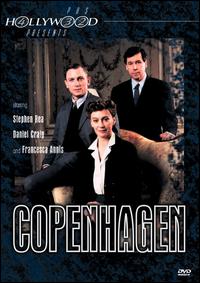This article needs additional citations for verification .(January 2010) |
| Copenhagen | |
|---|---|
 DVD cover | |
| Based on | Copenhagen by Michael Frayn |
| Screenplay by | Howard Davies |
| Directed by | Howard Davies |
| Starring | Francesca Annis Daniel Craig Stephen Rea |
| Theme music composer | Dominic Muldowney |
| Country of origin | United Kingdom |
| Original language | English |
| Production | |
| Executive producer | Simon Curtis |
| Producers | Megan Callaway Richard Fell |
| Cinematography | Ian Wilson |
| Editor | Kevin Lester |
| Running time | 90 minutes |
| Production companies | BBC KCET |
| Original release | |
| Release | 26 September 2002 |
Copenhagen is a 2002 British television drama film written and directed by Howard Davies, and starring Daniel Craig, Stephen Rea, and Francesca Annis. It is based on Michael Frayn's 1998 Tony Award-winning three-character play of the same name. [1]